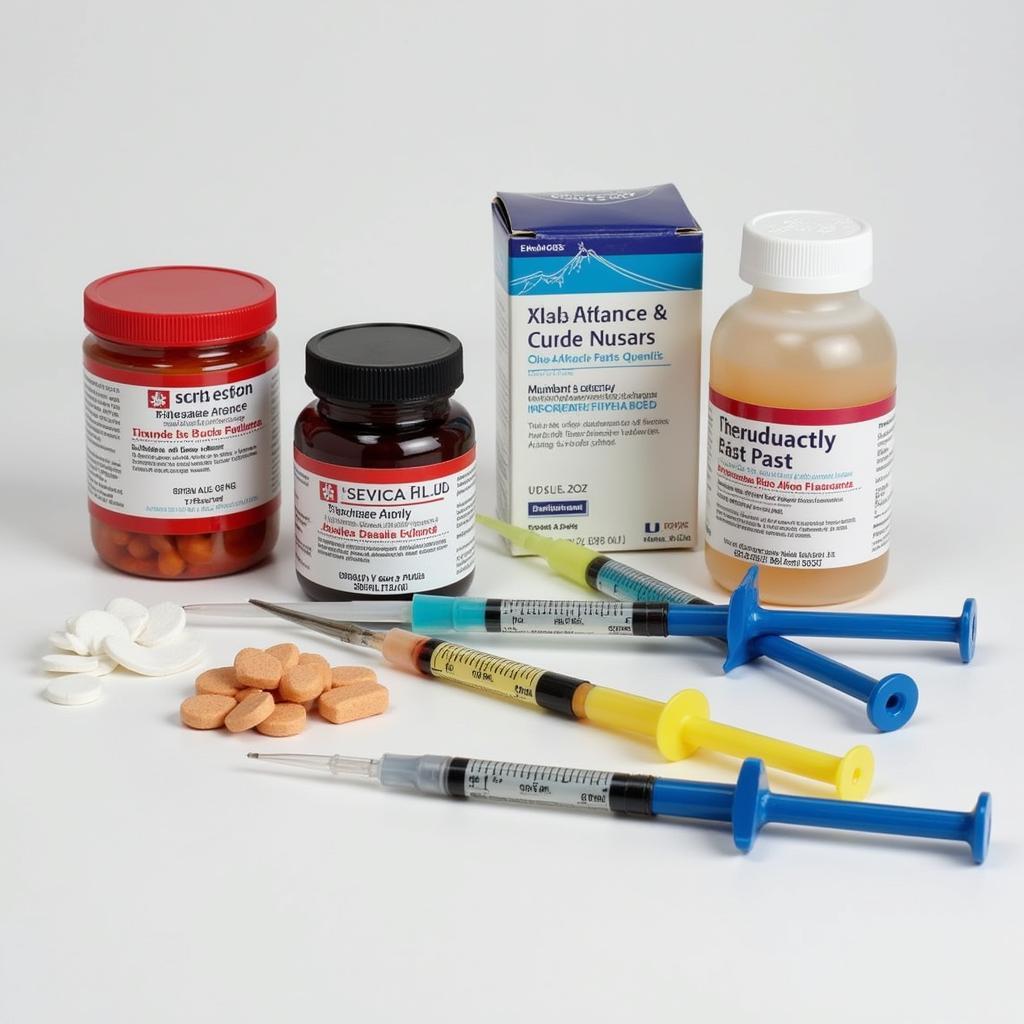Horse Muscle Relaxers are a topic that frequently generates questions from horse owners. Whether your equine companion is recovering from an injury, dealing with muscle spasms, or simply requires help relaxing during transport, it’s crucial to understand the what, why, and how of these medications. This comprehensive guide will delve into the world of horse muscle relaxers, providing you with the information you need to make informed decisions for your four-legged friend.
 Veterinarian Examining a Horse for Muscle Relaxant
Veterinarian Examining a Horse for Muscle Relaxant
What are Horse Muscle Relaxers?
Just like in humans, muscle relaxers for horses work by targeting the central nervous system to reduce muscle tension and alleviate pain associated with muscle spasms or stiffness. These medications fall into different categories, each with a unique mechanism of action and intended purpose.
Types of Horse Muscle Relaxers
The most commonly used muscle relaxants for horses can be broadly classified into:
- Methocarbamol: This medication is frequently used to manage muscle spasms and tremors. It works by blocking nerve impulses within the spinal cord that contribute to muscle spasticity.
- Guaifenesin: Primarily used as an expectorant, Guaifenesin also possesses muscle relaxant properties. It’s often administered in combination with other medications to facilitate short procedures or reduce anxiety during transport.
- Acepromazine: A sedative with muscle relaxant effects, Acepromazine is commonly used to alleviate anxiety and facilitate examinations or minor procedures. However, it’s important to note that it doesn’t provide pain relief.
- Benzodiazepines: This class of drugs, which includes Diazepam and Midazolam, acts on the central nervous system to induce muscle relaxation and sedation. They are typically employed for short-term use due to their potential for dependence and side effects.
 Various Forms of Muscle Relaxants for Horses
Various Forms of Muscle Relaxants for Horses
When are Horse Muscle Relaxers Necessary?
Muscle relaxers are not a one-size-fits-all solution. Your veterinarian will recommend the appropriate medication based on your horse’s specific condition and needs. Some common situations where muscle relaxers might be prescribed include:
- Muscle Spasms: Horses can experience muscle spasms due to various reasons, such as injuries, overuse, or electrolyte imbalances. Muscle relaxants can help alleviate the pain and discomfort associated with these spasms.
- Tetanus: This serious bacterial infection affects the nervous system and can lead to severe muscle rigidity and spasms. Muscle relaxers play a crucial role in managing the symptoms of tetanus.
- Pre-Anesthetic Medication: Before undergoing surgery, horses often receive muscle relaxants to ease anxiety, reduce the amount of general anesthetic required, and prevent muscle movement during the procedure.
- Transport: For horses that are stressed or anxious during transport, muscle relaxers can help keep them calm and minimize the risk of injury.
Potential Side Effects of Horse Muscle Relaxers
While generally safe when used as directed by a veterinarian, horse muscle relaxers can potentially cause side effects in some horses. It’s essential to be aware of these possibilities and monitor your horse closely for any adverse reactions.
Some common side effects include:
- Sedation: Drowsiness is a common side effect of many muscle relaxants.
- Loss of Coordination: Muscle relaxants can affect a horse’s balance and coordination, making it unsteady on its feet.
- Changes in Heart Rate and Blood Pressure: Certain muscle relaxants can impact a horse’s cardiovascular system, leading to changes in heart rate and blood pressure.
- Paradoxical Reactions: In rare cases, horses may exhibit paradoxical reactions to muscle relaxants, experiencing increased anxiety, excitement, or aggression.
 Horse Recovering After Muscle Relaxant Treatment
Horse Recovering After Muscle Relaxant Treatment
Administering Horse Muscle Relaxers Safely
The administration of muscle relaxers should only be done under the strict guidance of a qualified veterinarian. The dosage and route of administration (oral, intramuscular injection, intravenous injection) will vary depending on the specific medication, the horse’s weight, and the reason for treatment.
Important Considerations:
- Never administer muscle relaxants without a veterinarian’s prescription and guidance.
- Follow the veterinarian’s instructions meticulously regarding dosage and frequency.
- Be aware of any potential interactions with other medications your horse might be taking.
- Store muscle relaxers safely out of reach of children and animals.
When to Call Your Veterinarian
If your horse exhibits any unusual signs or symptoms after receiving a muscle relaxant, contact your veterinarian immediately. Early intervention is crucial in managing potential side effects and ensuring your horse’s well-being.
Conclusion
Horse muscle relaxers serve as valuable tools in managing a range of equine health conditions. From alleviating muscle spasms to facilitating medical procedures and easing transport stress, these medications play a significant role in equine veterinary care. However, responsible use under the guidance of a qualified veterinarian is paramount to ensuring the safety and well-being of your equine companion.
Need expert advice on horse care or have questions about muscle relaxers? Don’t hesitate to reach out! Our dedicated team at Justus Horses USA is here to assist you 24/7. Contact us at Phone Number: 0772127271, Email: [email protected], or visit us at QGM2+WX2, Vị Trung, Vị Thuỷ, Hậu Giang, Việt Nam. Your horse’s health is our priority!